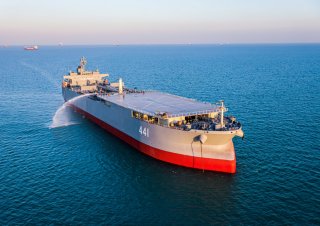Could Iran Beat Britain in a War?
It would certainly make any war difficult.
Here's What You Need to Remember: Statistics can be misleading. Britain and Iran are not in the same league at all.
Breathless was the headline in Britain’s tabloid Daily Express: “Iran military strength REVEALED as tensions with the UK soar.”
“A comparison of the UK and Iran’s military strength shows Britain falling behind when it comes to manpower, land and naval strength and petroleum resources,” the newspaper proclaimed after Iran seized a British tanker in the Persian Gulf, in retaliation for Britain seizing an Iranian tanker at Gibraltar.
The Daily Express article was based on GlobalFirepower.com, which features both statistics on the armed forces of 137 nations, and ranks those nations using a proprietary formula that apparently includes a nation’s population and military manpower, geographical size, financial strength, oil reserves, transportation infrastructure, and quantity of military hardware.
Britain ranks eighth on the “Global Firepower Index,” while Iran comes in not far behind in 14th place (the U.S. comes in first place, Israel 17th). Indeed, GlobalFirepower.com lists Iran as being stronger than Britain in several categories: 873,000 military personnel to Britain’s 233,000, 1,634 Iranian tanks to 331 British vehicles and 386 Iranian naval vessels to 76 British (Britain is credited with more airpower, with 811 military aircraft to 509 Iranian). Iran has more oil, but weaker finances.
All of which proves how much statistics can be misleading. Britain and Iran are not in the same league at all.
First and foremost, while Iran may or may not be developing nuclear weapons, Britain most certainly has them. And not some jury-rigged “physics package” assembled in an underground bunker, but four Vanguard-class nuclear submarines, each armed with 16 Trident thermonuclear-armed ballistic missiles. That’s enough atomic firepower to send Russia and China back to the Middle Ages, let alone Iran.
However, Britain wouldn’t use nukes against Iran for political reasons, and Iran would be committing suicide to use them against Britain or anyone else. Which leaves the more immediate prospect of a limited conflict in the Persian Gulf, most likely a reprise of the 1980s “Tanker War,” in which Iran will attack or seize oil tankers in retaliation for economic sanctions, while Britain (and the U.S., and possibly Europe) will attempt to stop them.
In which case, how many tanks Iran and Britain have doesn’t matter. Never mind that Britain’s Challenger 2 tanks are world-class vehicles that leave behind Iran’s larger but motley fleet of Russian, 1970s American and British, and indigenously manufactured tanks. But that’s not the point: Britain isn’t sending an armored division to invade Iran. And if it did, it would certainly be part of a multinational (mostly American) force.
Which leaves naval and air power as the key factors. Like its tank fleet, the Iranian navy is a large hodgepodge of Russian, North Korean and indigenous designs, as well as old Western vessels from the 1960s and 1970s. But it does have dozens of missile and torpedo boats, as well as small craft equipped with rocket launchers and machine guns that could potentially overwhelm a larger but lone warship. Britain has a more conventional navy of high-tech destroyers, frigates and even a new aircraft carrier – but at 76 ships, the Royal Navy is but a shadow of its former glory. Currently, Britain is only sending a single destroyer and a frigate as convoy escorts in the Persian Gulf.
Ditto in the air, where Iran’s museum mix of a handful of old American-made F-14 and F-4 fighters, Russian-made aircraft that fled from Iraq to Iran and were interned, and Iranian designs such as the Saeqeh, which looks remarkably like the F-5 fighters the U.S. sold to Iran in the 1970s. Britain has the advanced Eurofighter Typhoon, has now received its first F-35 stealth fighters, and can support its combat aircraft with an array of tankers, electronic warfare planes, and drones.
But here is where numerical comparisons of military strength really fail. If Iran were to invade Britain, there would be no question of which party is stronger. However, in the Persian Gulf, British forces are operating 3,000 miles from the UK. Even with access to bases belonging to Iran’s hostile Arab neighbors, the British would still be operating in Iran’s home waters, where all the tools of coastal guerrilla warfare – mines, small boat attacks – would be available to Tehran.
So is Britain or Iran stronger? It depends on the circumstances.
Michael Peck is a contributing writer for the National Interest. He can be found on Twitter and Facebook. This piece was originally featured in August 2019 and is being republished due to reader's interest.
Media: Reuters

